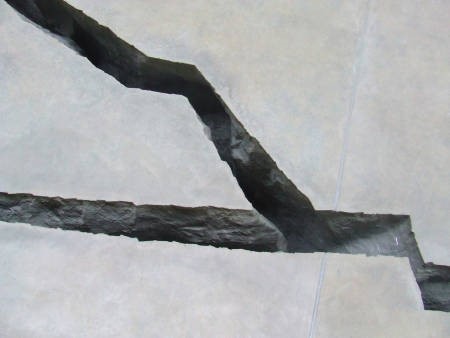Bible Readings: Ezekiel 37:1-14; Psalm 130; Romans 8:6-11; John 11:1-45
Image: Shibboleth, Doris Salcedo (Tate Modern, 2007)[1]
The image above is from an artwork by Doris Salcedo, a Columbian artist, who installed it in the Turbine Hall at the Tate Modern in 2007. It is a huge crack in the Hall floor. Those of you who have visited the Tate Modern can imagine how big that crack is and how far it goes. The title, Shibboleth, comes from a Bible story in the book of Judges, chapter 12, which tells of a spiteful battle between the Ephraimites and the Gileadites. The Gileadites prevailed and forded the Jordan River. Whenever a man sought to cross the river, the Gileadites asked him to say Shibboleth, a word meaning “stalk of grain” or “stream”. If the man was an Ephraimite, he would say Sibboleth in his own dialect, identifying himself as an Ephraimite and he would be killed. 42,000 Ephraimites were killed.
It is a story of death, just as our lectionary texts in Ezekiel and John are stories of death. Ezekiel is taken to a valley by the Spirit of the Lord and there he sees scores of dry, dead bones. In John, Jesus’ friend Lazarus dies. In both stories, the dead are brought back to life. But how?
The Spirit tells Ezekiel to prophesy to the bones. Remember: to prophesy in the Bible is not to tell the future but to deliver a word from God. Prophesy to the bones! Let the breath of God enter them! And in John, Jesus prays to his Abba and then cries in a loud voice outside the tomb where Lazarus has lain for four days, Lazarus! Come out!
Death is a stark figure in our lives these days. There are the innumerable small deaths involved in being locked down at home (if we are not essential workers), of losing time with friends and family, of our lost sense that we live in a basically safe and benign world. We watch our screens daily to hear the growing toll that Covid-19 is taking here in Britain and around the world. We fear for ourselves or our vulnerable loved ones; everyone seems vulnerable these days. In the rare moments that we are out and about, we shuffle aside to keep the compassionate space of 2 metres between us and another.
As I occasionally jog or walk around the neighbourhood in my allowed exercise time, I am noticing that people are not only physically distancing themselves, but many are also refusing to make eye contact, to speak or acknowledge me. This is distressing – we are beginning to associate strangers with disease vectors. We are in danger of losing precious parts of our humanity if we cannot acknowledge one another. We are all afraid. We are all vulnerable. We are in this together. I’ve made it a point to shout Good morning! or Hello! Nice day! when I see someone on the street now. I refuse to see any other person as simply a possible disease vector; they are me are we are us.
The Gileadites killed the Ephraimites out of fear. The word the Spirit urges us to prophesy into dry bones and dusty tombs is love. Come out! Jesus shouts. Come out of your fear; remove your tangled grave clothes. We are not dead yet. And so long as we live, we shall shout Love into the wind. The crack that is spreading in the foundation of our world cannot be denied, but we will bridge it with words and deeds of love. It is what we are made for.
In Christian love,
Carla
[1] Permission for use sought.

